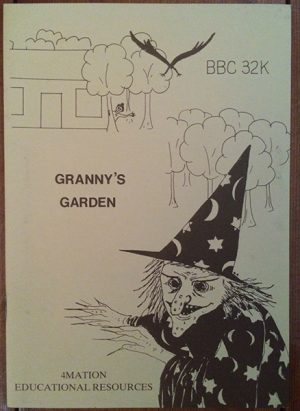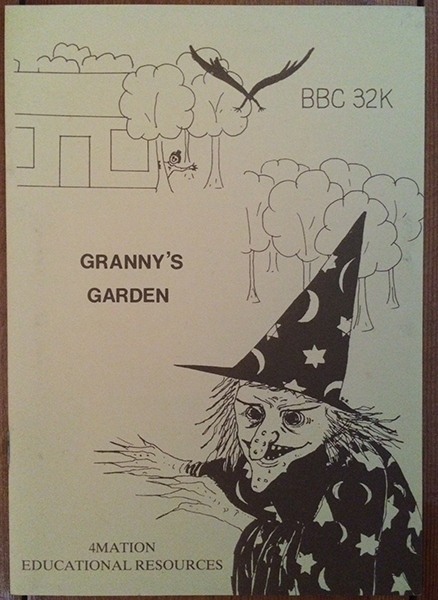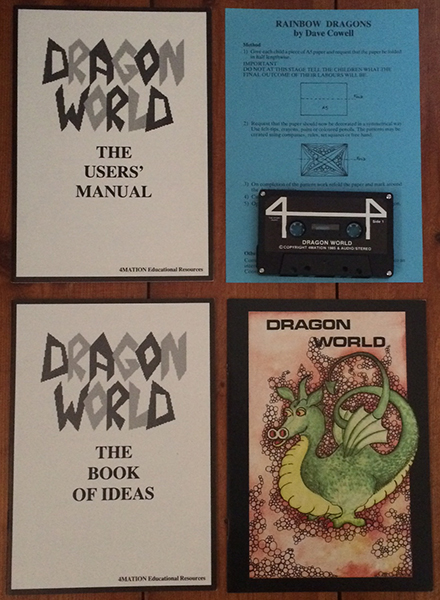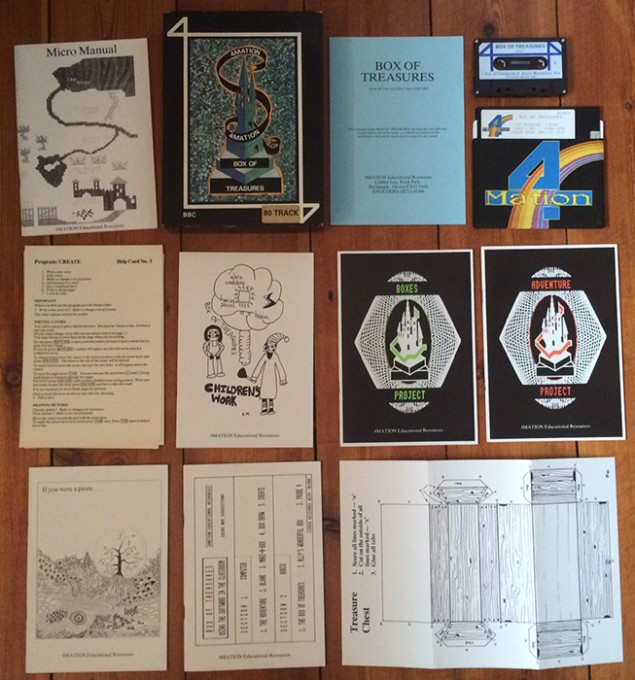4Mation: A British/Australian Box of Treasures

[ 2 comments ]
For many British children growing up in the 1980s, the theme tune and sight of the witch in the educational game Granny’s Garden will often evoke a nostalgic response. Released in 1983, Granny’s Garden was developed by Mike Matson, a deputy head teacher at a school in Devon and an Advisory Teacher for Computers. Following the release of the BBC Micro (the microcomputer at the heart of the British Broadcasting Corporation’s Computer Literacy Project, developed by Acorn Computers Ltd) schools across Britain started to purchase the machine as government initiatives led to discounted machines and a drive to educate a population about the microcomputing revolution. Mike Matson was one of the teachers to persuade his school to buy a BBC Micro, yet upon its arrival he was soon disappointed about the range of educational software available for the classroom, and lack thereof.
Matson set about to rectify this and started programming what became Granny’s Garden; an adventure game focused on not just playing the game and solving bizarre puzzles involving trees and dragons, but also providing a way of extending the narrative and play spaces of the game through related activities. Matson was aware that schools often only had one computer in a classroom therefore, the need to provide other activities was just as important.
Granny’s Garden Manual
Along with developing the game Matson, along with his friend Neil Souch, also set up 4Mation as a way of publishing their games. It was this move that also provided a stepping stone to continuing their educational software making business as they were able to create and publish their own titles, including Flowers of Crystal, Dragon World and Box of Treasures. However, as this this blog post will reveal, Granny’s Garden and 4Mation software was not limited to a British audience. In a later interview with Mark Green on the pixelatron website Matson reveals how Granny’s Garden, “was a huge success in Australia and New Zealand, and I got to visit a school in Tasmania and see the kids’ Granny’s Garden work on the wall.”
Dragon World
Whilst researching 4Mation for a book I’ve been writing about the BBC Microcomputer, and revisiting my own archive of 4Mation games from my childhood, it was interesting to see an example of how BBC Micro software had been used outside of Britain. The Box of Treasures package in particular provides an interesting reflection on Matson’s research and development process across continents, due to his involvement with schools in the Victoria region whilst trialing versions of the game. Released in 1985, Box of Treasures has the trademark qualities of a 4Mation package, including the software and multiple resource booklets along with help guides for teachers to use in the classroom. This point is emphasised in the introductory booklet, which states, “Please note that there is more in the box than a couple of floppy discs.” The Box of Adventures pack enabled a space of creativity, providing worksheets, software programs such as Adventure and Create to “encourage creativity and imagination, communication, resourcefulness and problem solving”. Unlike the game of Granny’s Garden, the Box of Adventures was more of a sandpit approach with numerous resources and suggestions but no fixed work plan as to how they should be used; the possibilities in many ways, became endless.
Box of Treasures
One of the educational resources included in the package states the involvement of two teachers in Melbourne Primary Schools who were “given the opportunity to use the Adventure and Create [programs] for a fortnight”. Interestingly the booklet continues to state how “the children had, until that time, experience with Apple computers only. They were lent a BBC machine and left to get started on their own”.
Images of students using some of the programs in Box of Adventures in a grade five/six class, are captured in one of the resource booklets, showing how the classroom walls of Maribyrnong Primary School were covered with paper decorated as castle walls layered with images of dragons and witches amongst other drawings.
Consultations with other schools in the region also document work undertaken with Mount Macedon Primary School in Victoria. Encouraged to write accounts of what they might keep in a box, the Mount Macedon Primary School children were posed the question “If you had 60 seconds to leave your home what would you take with you?” based on their accounts of their community suffering wide-spread damage in the Ash Wednesday bushfires of 1983. Although not always factual accounts of what students took with them, the texts provide an insight into some of what they children may have experienced during that time.
The acknowledgements page including in Box of Treasures lists a long line of schools in the Victoria region – it would be interesting to know if anyone attended or worked for one of these and/or remembers trying out or using 4Mation’s software (if so, please get in touch!). The list includes the following (no doubt there were others too):
“Bruce Dixon and The Logic Shop, High Street, Armadale, Melbourne for lending so many BBC systems to Maribyrnong Primary School and the Western Region Curriculum Centre that, for a short while, the shop’s entire stock of Beebs seemed to be out on loan”
“Ian Daws, Terry Robertson (and the children) of Maribyrnong Primary School, Maribyrnong, Melbourne for agreeing to the request to ‘try out’ a couple of the programs and then processing to go utterly berserk on a ‘Box of Treasures’ project (or is it theme?)”
“The staff and children of Nornington Peninsula Community School, Victoria, for finding some bugs in earlier versions of the software”
“Mount Macedon Primary Schools”
“Ross Schnioffsky (Computer Consultant) and Marlene De Lorenzo (Music/Drama Consultant) of the Western Region Curriculum Centre, Footscray, Melbourne for their invaluable contributions to the curriculum ideas”
“Anne Sly for her Taswords”
Alison Gazzard, is a Lecturer in Media Arts at the Institute of Education in the UK currently researching British microcomputing in the 1980s. She learnt to program on the BBC Micro.




Jacaranda Software distributed 4Mation Software titles in Australia. Mike and Neil made several trips to Brisbane, resulting several of Jacaranda’s packages being distributed in UK. These included “Bush Rescue”, released just in time to catch the UK schools’ enthusiasm for Australia during the 1988 Bicentenary celebrations. Mike’s suggestions were very welcome (if not always acted upon) and the relationship continued very successfully after Jacaranda sold their software division to Greygum Software in 1992.
According to the introduction screen on the Apple 2 version, Zoopak was also a 4Mation title, copyright 1987. Bush Rescue was copyright 1987 as well. Must have been a busy year.
Attached image: